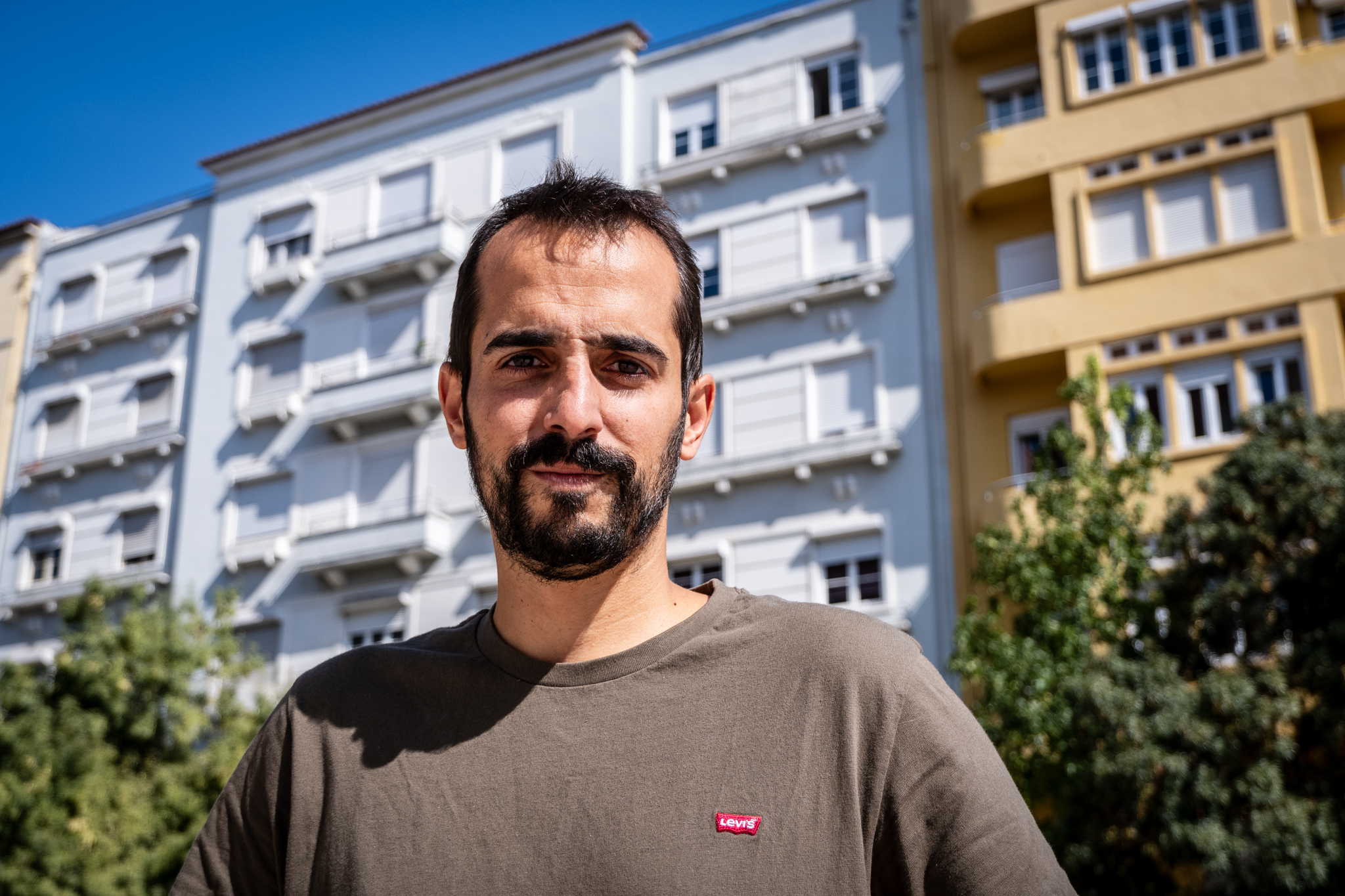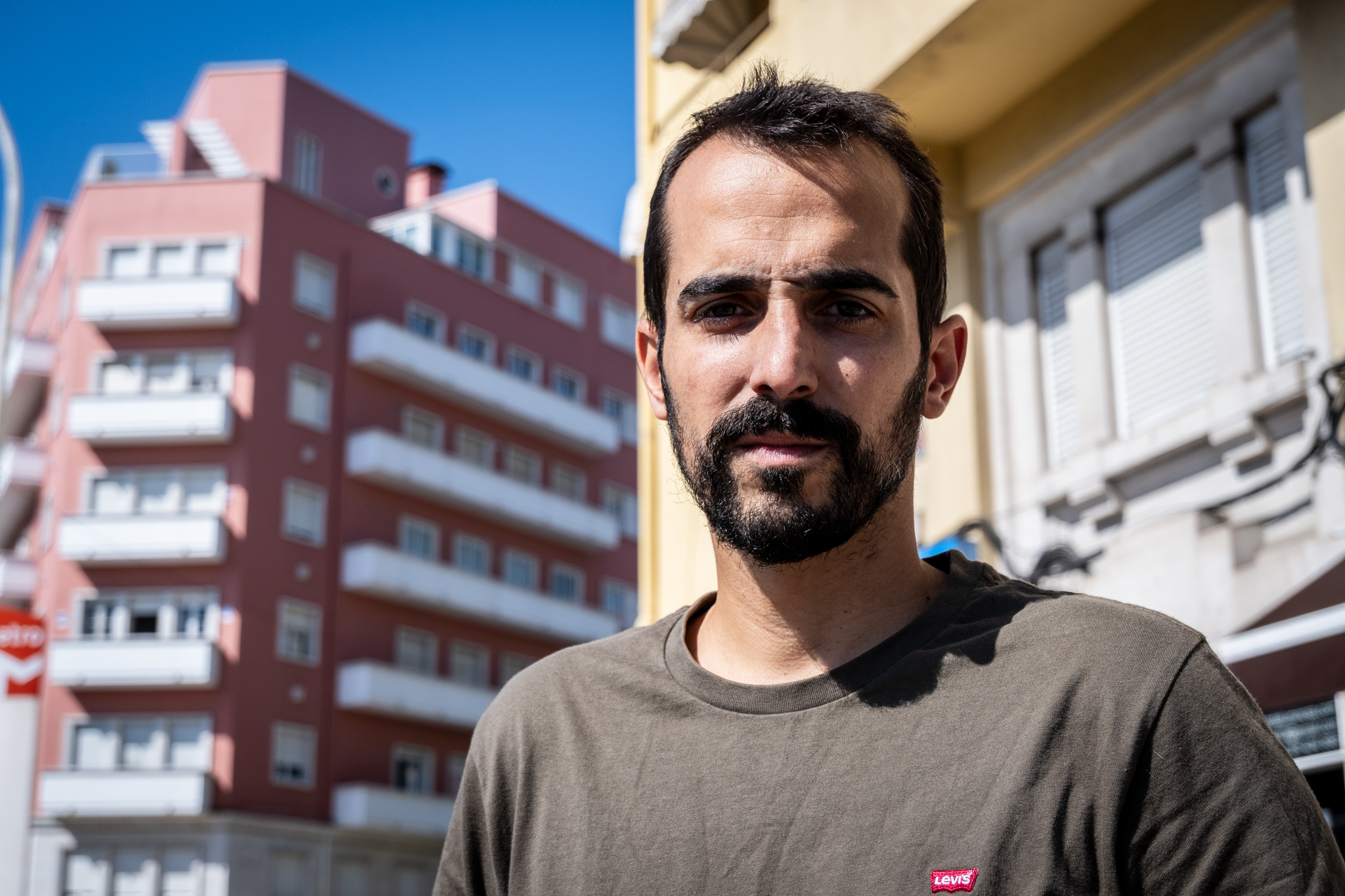With Vasco Barata, a member of the Chão das Lutas association, one of the many organizers of the housing demonstration on the 30th, we take stock of the protest that brought tens of thousands to the streets. And an update on a crisis that affects far too many people.

Vasco Barata is a member of Floor of Struggles, an association for the defense of the right to housing, and also municipal deputy for the Left Bloc in Lisbon. But it's with his associative role that he sits down with us at a café table in Alameda D. Afonso Henriques - the place from where, a week and a half ago, he left another demonstration for housingorganized by the civic platform House to Live Inof which Chão das Lutas is a part.
Vasco, who has a law degree and a master's degree in legal and criminal sciences, sat down with LPP to take stock of the demonstration. So that it can have a continuity and depth that, in the immediacy of the moment, is not possible.
Part 1
What is your assessment of this demonstration?
In Portugal we are finally witnessing a great popular mobilization for the right to housing and I think we should be proud of that. Housing is a fundamental right that has been somewhat forgotten by the political powers, ever since, in fact. This year, April 1st was marked by a large demonstration with around 30,000 people in Lisbon.
And it was possible that this mobilization and organization didn't stop there, and that the living forces of the city continued to work together and set up a new demonstration, which was on 30 September. It was a demonstration that grew in terms of support throughout the country and in Lisbon, very significantly, with more than 40,000 people, close to 50,000 people on the streets. This shows us that only with this organization, only with this capacity for people to unite and join forces, working together, can we also put this issue, with the importance it has for people, on the agenda.
We know that housing is currently the biggest problem people have in their lives. Whether it's those who have bought a house and have a high mortgage that they can't afford, or those who are in the rental market and also have unaffordable rents for their salaries, or those who are in the informal market because they don't even have a rental contract, or young people... So it's a process that cuts across the whole of society. I'd say it's very important for our democracy to have this organization of people who are mobilizing for such an important issue.
How can you unite different associations and movements around a common cause and, at the same time, cross housing with other issues such as climate change?
I think this work of convergence results from the way people come together, debate and exchange ideas. This is very important, especially in the aftermath of the pandemic (we're still a bit in the aftermath of the pandemic, but not so much anymore, of course). It's important to give that signal that the city is getting organized again, getting together again, debating issues frankly. The movements have different work and strategies, but all these strategies converge on the essential, which is to give a social response to this problem - whether it's the fight against evictions, the fight to regulate the market, the fight against illegal demolitions without an alternative, or the issue of bank loans.
Today, we have a social movement of various associations, I think very rich, with a lot of work that should be valued, and this movement is prepared to respond to all the problems. It wouldn't make sense for each association - and that's what didn't happen - to fight individually instead of working together, because it's together that we're much better able to respond to the problem.
Then there are several other issues that intersect with housing. The climate issue comes up naturally. We know, for example, that construction is one of the sectors that emits the most pollutants. And, in Portugal, if we want to solve the housing problem and also tackle climate change, we can't start building almost blindly, not only because it wouldn't be effective from the outset in solving the housing crisis, but also because of the climate issue.
On the other hand, one of the problems that most affects the Portuguese population in their homes is that of energy efficiency. We don't have houses that are prepared for the cold or the heat, and this is also a question of climate change. We should have been concerned about this in the refurbishment of houses, which we haven't been. We often say that tourism has been very positive in renovating and rebuilding city centers, but if this reconstruction has taken place, why are people still freezing in these houses? It's because, for example, the reconstruction that was carried out didn't take energy efficiency into account. It was more of a facade reconstruction, more of a clean-up, so to speak, to make the city more beautiful, but not more efficient, better prepared or more comfortable.
So these issues are related, just as the LGBTQI+ issue is related because we know that these are the people who suffer other types of discrimination when it comes to accessing a home, just as there is the migrant issue, because we know that migrants are the ones who find it even more difficult to receive a home and live in very undignified situations with hot beds, where they rent not a room, but a bed. All of this is related. Housing today is at the center of a lot of discrimination, a lot of problems and a lot of poverty. So it makes sense that this fight shouldn't stop at movements for the right to housing.
It will be difficult to focus on one message because there are so many themes and people involved. How can we guarantee a common space and not create noise, discredit and decontext?
It's a process of trust, I think. I can only speak for Chão das Lutas. It's a process of trust, of sincere and frank debate, in which we put the people and the cause of housing at the center and don't get carried away by side issues. At a demonstration with 50,000 people, we can't be worried about what each person writes on their placard. That's the richness of democracy: people can go out and write what they want. We know that for people who think that housing is a financial asset or that it should be left to the market without any kind of regulation, anything will do to try to campaign against it on social media.
But we also know that no transformation comes from social media. Social networks play an important role in communication, and we use these channels, but the most important thing, on a day-to-day basis, is to be in debates, face-to-face, because that's where we can build relationships of trust, get to know concrete problems and be prepared to respond to the debate that takes place in the public arena. So I think that's the basis, a basis of trust and of working together, respecting the differences of each association, which are legitimate of course, and they all do very important work.
And what was the role of the parties, which were also present?
The demonstration was by the social movements, and that was and is clear. If you look at the movement, the route, who was leading the demonstration, the spokespeople who spoke, the ideas, all of that... you can see that the day belonged to the various movements that organized the demonstration through the platform House to Live In.
Now, we live in a democratic system, and the parties that were visible were of various political sensibilities. Parties are free to be wherever they want to be. The specific case of Chega had a peaceful and expressive response from people, because nobody understands that Chega is a party that has an answer to the housing problem. A party that is financed by lobby real estate, by real estate funds, by people linked to the worst real estate speculation that this sector has to offer, it's obvious that being at a demonstration for the right to housing doesn't make much sense.
I would say that this issue has been resolved. There was no protagonism, except the protagonism of the associations, of the activists who organized the demonstration.
Part 2
Looking at the housing crisis now and the package More HousingWhat measures could be more distinctive? What remains to be done?
The problem of More Housing is a problem of political choices of what it represents. In its entirety, the More Housing brings tax benefits, a wrong formula for solving the housing problem. It has, in fact, been the formula tried by successive governments, especially the PS and PSD. And it hasn't worked. Before the More HousingPortugal was losing between 800 and 2.2 billion euros a year in tax benefits linked to real estate. Deepening that figure, in other words, giving more benefits, seems to us to be the wrong solution, because it means insisting on something that isn't working. And the fact that it isn't working isn't a matter of degree. In fact, there is a very perverse issue in this program: anyone who wants to sell their house to the state, after having spent years profiting from a speculative sector, doesn't pay any kind of tax. This also gives us great inequality. So we have very desperate fiscal measures.

As far as Local Accommodation is concerned, it seems to us that the government is playing with words, because there is no limitation on Local Accommodation when it says that no more licenses will be given out in an area like Lisbon, where there is nowhere else to attack. We have parishes with almost 70% of houses in Local Accommodation; the city has a big problem of 20,000 Local Accommodation houses; it's a very expressive sector. When we compare it with other cities that have tourism, people don't believe the number of Local Accommodation and tourist beds we have in Lisbon. To give you an example, we have 200 tourist beds per 100 inhabitants. In the Gothic Quarter in Barcelona, there are 70 tourist beds per 100 inhabitants. And the Gothic Quarter in Barcelona is considered the pinnacle of tourism, so to speak.
Then, the only More Housing What I see that could have made sense - but which would have had to have been taken ten or eight years ago - was to limit rent increases to new contracts. This could have had an important impact on containing some price rises, and at this point, telling people that the rent is going to increase but that it's going to increase little, when their salaries are no longer keeping up with the increase in housing prices, is saying that they're going to be in an even worse situation.
What's worse, the government announced these measures without implementing them. In other words, we're talking about More Housing communicated in February and only now has it been promulgated. And it's not all the President's fault. The government might not have announced the measures, so that the market couldn't react, for example, to measures that will limit rent increases. What happened, to be very specific? With the government saying it was going to limit rent increases, there was pressure and a rush by landlords not to renew contracts and to make the most of their homes, because they knew there would be a limit. So what we had was even greater pressure from landlords at this stage, because they were reacting to an announcement from the government.
If the government had wanted to be consistent, it would have applied the measure in such a way as not to give rise to this exploitation. Now we are entering a new phase after rents have risen enormously again, especially in cities like Lisbon, which is also what interests us in this conversation, and where people are still completely unprotected because wages are too low for the price paid on the market.
Moving on to Lisbon and the Municipal Housing Charter that was being drawn up: one of the priorities is to build more for Affordable Rent, something that hasn't been done vigorously in the last decade. Do we need more construction?
From my perspective, the talk of building more should always be accompanied by a few questions: building where, building for whom, and building how. Does it make sense for us to say that what is needed is to build, period? No. We are building. We're building towers for the luxury sector. The luxury sector continues to build. And if an investor or a landowner who wants to build a house on a plot of land can build for the luxury sector, where they will make a profit of one million euros on a studio, why would they build for Affordable Rent? That's a problem.
First we have to rehabilitate what exists, instead of building more. And this could have been done much faster. For example, Campo de Ourique has a barracks on Rua Ferreira Borges, which is very impressive and doesn't have a life today. And it doesn't make sense for there to be a barracks in an area of the city center. Couldn't we have already taken the step of rehabilitating that barracks so that it could become housing, so that it could be transformed into student residences, or so that it could become an Affordable Rent program? We could have done that perfectly well. And whoever says the Campo de Ourique barracks, says the Miguel Bombarda Hospital, says many other infrastructures in the city center that could have already been rehabilitated for people.
The government could do this in partnership with the City Council. If you tell me that there are areas where it's still possible to build in Lisbon and that we're going to do public construction for Affordable Rent, I think that's a more interesting path. We're not putting all our chips on the line that we're going to build more, pure and simple, because building alone won't solve the problem; we need to regulate the market. But with public construction programs for affordable rents, then new construction could be a way forward.
And it's a path that has proved more or less consistent in recent years. Unlike, for example, something that is in the Municipal Housing Charter again, which had already been tried by the previous executive, which is the regime of Public-Private Partnerships for housing. That was a model that didn't deliver any houses in Lisbon, and it's wrong. For example, Berlin is starting to lose rent-controlled houses because 20-30 years ago they did this kind of program, where private individuals would build, the house would have to stay in the controlled market for 30 years and then it would move to the free market. What's happening now? Every year, new houses that were rent-controlled move to the free market. We have to make sure that doesn't happen here.
Building more public housing is important in certain areas. O Vale de Santo António could be an interesting program. Restelo would have been an interesting program. Now, what we see from the current executive is that it has done what was already underway from the previous one, that is, it is completing some processes that were already underway, but it has closed the hypothesis that it was still possible to close. Restelo could be underway and would be an interesting program, not least because it's an area of the city where it's important to have Affordable Rent. We're worried that the construction of public Affordable Rent projects has been put on the back burner. What we've been hearing from the Councillor for Housing is no intention of resuming them; the mandate is half over, so if there was such an intention, something would have had to be done about it.
The council says it is trying to prioritize the projects for which it has funding and that it can complete within the deadlines indicated.
The management of the narrative, of why certain things are moving forward or not, is the responsibility of the executive. For us, as concerned people, we measure a little by the results and by what is concretely applied. We don't see any houses planned, in other words, we don't see a process launched by this executive, and naturally it would be the next executive - whoever wins the next elections - who would close that project.
Things take time and that's normal. It doesn't matter who puts up the flag, people just want houses. That's part of democratic life. Neither those who designed the project have to worry too much about who ends up delivering the houses; nor those who are now delivering the houses should try to make fools of people, thinking that it took two years to build. These are all things that say little to people, in my opinion.
Even the promise of 6,000 homes for Affordable Rent, Medina completely failed, which could have been complemented with other measures: more restrictions on Local Accommodation; using the institutional pressure that the City Council has in terms of national policies to put pressure on the government to regulate the market and lower prices; the City Council itself taking a more active role in the issue of requalifying what already exists.
What do you think of this model of the state renting and then subletting?
It was something Medina did in Lisbon, with a program called Secure Income; and is now in More Housing under another name. I think it's a wrong and ineffective program. I'm shocked that something that was tried in Lisbon and failed is being tried again. The expression of the houses that have been collected does not justify channeling public funds, because what we are doing with these programs is subsidizing speculative prices; the municipality or the state rents at prices that are speculative and guarantees that these prices are maintained. Even if they are slightly below the market price, they are still very high prices.
So it's public money that could be channeled into more structurally relevant housing policies. And the result is 100 houses, 200 houses, in these programs. When I hear the Minister say that if there's a program that brings 100, 200 houses, it's already a success, because it's 100, 200 families that we're helping.... I think this is not a serious way of discussing public policies. If that were the case, with any program that brings a house onto the housing market, we're helping a family. We have to have a vision that solves the problem in a structural way. That's what's important.
Affordable Income is also limited in terms of impact.
It's insufficient, but even so, the problem with the Affordable Rent Program is a lack of scale. The program should be deepened, so that we have more houses at controlled prices, more public houses that people can access. And this without forgetting the poorest classes, who, with this boom The problem of housing is somewhat forgotten because it seems to be a problem almost only for the middle class. We need to have measures for all social sectors, so that there is a robust public housing stock.
Still on the subject of construction, just to be clear: it is a common narrative on the liberal side to say that the problem with housing in Portugal is that there is a shortage of homes and that we therefore have to build more so that there is more supply and prices fall. Nuno Serra writes about this in Seventy Four very clearly: we are one of the countries with the best ratio of households to houses. We have 1.5 houses per household. So there are more houses than families. The simple logic that building more makes prices go down is quite fallacious, because it's an argument that uses the law of supply and demand but is only concerned with supply. Demand has fallen because we have less population.
At the time when Renda Segura was introduced, Fernando Medina made statements saying that if Renda Segura failed, we would have to regulate the price of rents. And Renda Segura failed.
Should we regulate the price of rents?
We should control the price of rents. And regulating the price of rents also means regulating the price of new contracts. In fact, the government has a proposal to limit increases to new contracts. Now, the problem is that the measure comes so late that it won't have a very significant effect. And I think what would be fair is to find a formula that connects people's incomes, the type of property, the location of that property... and gives a price, by city, that is considered appropriate. For example, a 3-bedroom apartment in Lisbon would be worth more, in this rent control, than a 3-bedroom apartment in Castelo Branco, for example. For various reasons, including the fact that people also earn more in Lisbon than they do in Castelo Branco. So it's a question of adapting the price of houses to people's incomes and their typology.
There is no rational reason for us to allow a house to go from €500 to €700 just because a contract expires. This is a speculative increase. In many cases, there are no maintenance works, no energy improvements, nothing the landlord has done that brings any value to the city. There may even be increases, let's imagine, if the landlord does work to improve the apartment's energy efficiency, if he does structural work. There is some logic there. Now, what we have at the moment is to allow speculative contracts just for the course of time.
Rent control works. It's an important measure that has various nuances, in other words, it's been adopted in various ways. Each country needs to find its own model, a model that works for them; the specifics of each country matter. We have to find our own model. The government already regulates the price of rents with the Porta 65 ordinance, which it recently updated. With this ordinance, it is saying what it considers to be a fair price for a 3-bedroom, 2-bedroom, 1-bedroom, studio... in the various municipalities. So the government itself no longer has an ordinance that sets the values. This could be an interesting starting point: we look at Porta 65 and open up a process of regulation. It wouldn't happen overnight, of course. The important thing is to find a regulation that reduces rents in the short term and then allows for weighted increases that keep pace with people's salaries. And that also helps prevent evictions, protecting people from such dramatic situations.
Couldn't this lead to landlords moving their houses from the formal rental market to the parallel market?
Two points on this issue. First, why did the landlords take the houses? I follow the Tom SlaterHe is a Scottish professor, a geographer, who is now teaching in Colombia and who has done a lot of work on rent control. He says that this is one of the myths and that it is documented how this myth arose, from some very unindependent studies that appeared in pamphlet form but were given credit.
And if we think rationally, to say that if there are rent controls, landlords will take houses off the market is to say that a person is only willing to be in an economic sector - I don't like the term, but for the purposes of the debate, let's accept it as an economic sector - if they have a 100% guarantee of the profit they can make. It's like saying, for example, that if you increase the national minimum wage there won't be any jobs, because then employers will stop employing people. And that doesn't happen. Why would someone who has a house and is charging a thousand euros take it off the rental market if they were told they could only charge 800? What's the rationale for saying that you don't want to receive anything? It doesn't make much sense. This myth is a pressure that arises to prevent this measure from being applied.
The other issue seems more real and more important: it has to do with combating a migration to the informal market. Point one, there is already a lot of informal market even without rent control, and that's a problem. Point two: for any housing measure, rent control or regulation, there needs to be a relevant public institute with the means and capacity to supervise. There would have to be public investment. I don't have this debate very closed, but IHRU [Institute of Housing and Urban Rehabilitation] I could be something other than what I am. It could have new powers.
In Holland, for example, there is rent control - that is, there is rent control in liberal countries; most of the countries that have rent control in Europe are even countries with a liberal tradition. And there is or was (they are now going through a process of dismantling some housing policies, not least because of their current political configuration) a figure, an entity... - I don't know now if it would be a court or just an administrative entity - but there was something that people could turn to with the power to set the rent. They would say that they had a certain rent and they wanted to know if the amount they were being charged was appropriate; and this body would analyze the case and, if it concluded that the amount they were being charged was excessive, the person's rent would be brought down to an appropriate amount, the person would have a contract for an appropriate amount of rent.
It's important that the state doesn't shy away from monitoring, even the informal ones that already exist.
People are often blackmailed...
And it's not just economic blackmail, it's also a question of power. Because there are people who prefer to rent their house informally because then they always have the blackmail of being able to remove the person or threaten them with it, because in legal terms it's not like that.
It's important for people to know that if they are in an informal situation, there is a law that protects them. If you've lived in the house for more than six months without a contract and you have proof, you may be entitled to a contract. It's important to make people aware of this. But, as the government said, the state can't resign. It can't leave people on their own.

Shouldn't the state also have a role to play in vacancies?
When Lisbon's Housing Councillor began her mandate, she gave a signal that seemed important to us. At the opening of the process that culminated in the Municipal Housing Charter, she said that there was no shortage of houses in Lisbon; that she had the data from the Census and that Lisbon had 46,000 empty private houses and 2,000 empty public houses. In all, 48,000 empty homes. So her focus, the councilor's focus, was to make these houses available for people to live in.
And we were pleasantly surprised, because it was actually a very important path. This path seems to have been abandoned and we don't know why, but it no longer seems to be a priority. We still have 46,000 empty houses in Lisbon. It would be important to know how this situation is going to be resolved. There are many houses where the municipality could carry out coercive works, notifying the owner, who sometimes may not even have the means to do these works. This is not something that is on the Municipal Charter as a priority.
Then there's the question of IMT exemption. It's a drop in the ocean and it's seen as the basis of a political housing program. It's not because people have to pay five, six or seven thousand euros in IMT that they don't buy houses. They don't buy because house prices are prohibitive because they are speculative.
Another question: do we want, as a society, as a country, as a municipality, to have a housing policy that favors buying a house? Which is the wrong policy and which other countries haven't followed, which is a policy that throws people into a 45 or 40 year mortgage. Or do we want our society to be much more like a paradigm of renters, of people who live on a lease, and their lease has to be protected, it has to be secure, it has to allow people to have stability, which is what happens in other countries?
Can't we have both?
We're not talking about banning people from buying houses. This is about how we manage our money, about how we channel public money into housing policies. Should our money, everyone's money, be channeled into tax breaks so that someone can buy a house? I don't think so.
I believe that our money should be channeled into robust public housing programs, and the same goes for rental subsidies. I understand that, for those who are on the edge of their lives because they're living on the edge of their lives, the money from a subsidy can help with their housing costs. But now let's think longer term, on a rational level. Does it make sense for our public money to be channeled into maintaining existing prices, which are already speculative, when one day the subsidies will end because a public policy that forever pays the rent that people are paying to the landlord is not sustainable? So when that money runs out or that subsidy runs out - it could even run out because the government changes - people will be less protected. What I think would be necessary is to have a more structural vision, both in the Municipal Charter and in Mais Habitação - putting things at the same level: the vision of the city and the vision of the country, I think it would be much more important to attack the problem in a structural way, and I think this is what is not being done.
Part 3
Could there be some specific regulation for certain professional sectors, to bring people to the center?
Absolutely. This is absolutely essential. A policeman who earns a thousand euros and who has to pass through the city of Lisbon at the start of his career and then be posted to the area of his choice - I don't think I'm saying anything wrong - can't do it. Living in Lisbon at the moment on a salary of a thousand euros or something like that just doesn't cut it. If a room costs 600 euros, or 450 on average, and you then have to pay for gas, water.... You can't. And if you're talking about a policeman, you're talking about a teacher. Why is there a shortage of teachers in Lisbon? It's not that teachers don't want to come, they can't come to Lisbon. And the same goes for other professions, such as doctors, who used to be seen as a class that would be safe from this kind of problem and who today can no longer plan their lives and afford a house. And when we talk about these professions - policemen, teachers, doctors - we always have to be aware that there are many other professions that earn the minimum wage, or that don't even earn the minimum wage because they are informal, and that are pushed into truly dramatic situations, such as the case of Mouraria, where people have died because of the lack of housing conditions.
This social drama clashes a lot with the narratives we see of great dramatizations regarding Local Accommodation, regarding landlords.
I think we've lost track of what real drama is. Drama is people living in a bed and not even having the money to rent a room. A drama is not having rent control where people charge a rent that is fair. Society must evolve so that people have a profession other than living off the rent of a property they own. But isn't maintaining a property, looking after a property, a profession? No, it's a legal obligation. Anyone who owns a house has to keep it in a habitable condition. When we make it not an obligation but almost like a job, that's wrong from our point of view.
What do you say, then, to the people who have this freedom to have Local Accommodation and who make a living from it?
There is one thing that shocks me deeply - and I feel free to say so because I wrote about it before the Supreme Court's decision. Local Accommodation was created on the basis of an illegality. There is no way around it: houses, when they are licensed as they are when there is a project, have a license and that license says whether the fraction is for residential use, for commerce or for others. There's no data, but I'd say that almost 100%, 90% of all Local Housing - the vast majority - is in houses that have a housing license. Anyone who has seen the land registry of a building in horizontal property knows how things are licensed in Portugal: here we are in the café, so this area downstairs is for commercial use, and the fractions upstairs are for residential use. The Supreme Court of Justice has already ruled that this illegality exists: there can be no Local Accommodation in fractions that have residential use.
What shocks me is that the government in the first place, but also the municipality, does nothing, because the government would have an obligation to carry out a survey and act to restore legality. In other words, the houses that have a housing function should be used for people to live in. And the municipality shouldn't be oblivious to this either and would also have the power to restore this legality; it can't look at around 20,000 houses that are illegally used for commercial activity and turn a blind eye and do nothing. For example, if I want a lawyer's office in my house, I can't, and rightly so, because the house I'm in, if it were mine, is for people to live in, not for me to have my business. This is the first point about Local Accommodation.
For the rest, we can discuss everything. But having a sector of activity that is sustained by illegality is something that really confuses me. Then, in cases where it was legal, we would already have much more natural regulation. Then, the law would already serve to regulate, since anyone who had a fraction that could be used for commercial activity and wanted to have their Local Accommodation there, it's fine for anyone to be against it - it's a commercial activity, no one here is demonizing anything.
What's more, if this reality were restored, we'd have real Local Accommodation in place, which is the case that has always existed where I have an extra room in my house that I decide to make extra money from by putting that room up for rent for a certain period. Nobody is demonizing that either. In fact, people have always rented out their homes in the summer. What I'm saying is that it's not acceptable for a house that is used for people to live in to have no one living there and for it to be used only as a business. What Local Accommodation has brought is, under the guise of something new, something quite old, which is the cannibalization of cities by tourism sectors. When we see that hotel chains have Local Accommodation, it makes us wonder where we're going and how true the narrative is that Local Accommodation is a sector of small owners. In my opinion, it is false. It may have been in the beginning. That's no longer the case today.
Now back to the demonstration, to finish. Next steps so that this struggle doesn't fall by the wayside?
If these demonstrations had fallen on deaf ears, I think we would have gone from 30,000 people in April to 5,000 people at this demonstration. People want immediate action, and so do we. We are the people who are struggling to pay the rent. The demonstration was organized by these people, because they want solutions.
To give a parallel, the Fuck the Troika at the time, stopped a TSU measure, but there was no immediate reversal of the Troika measures by the Passos Coelho government. But after that there was a return of the vacation months that had been cut, there was a reinstatement of pensions, there was a series of things that this mobilization managed to give back to people. I'm not saying that this is where we are, and I'm not going to say that the regime for non-habitual residents has ended or is going to end because of the demonstration.
But I know that's also why. I'm sure that when Fernando Medina said last year that the regime for non-habitual residents was essential, but now wants to end it, it's because there was a consequence to the mobilization. It's not the only consequence we want. We wanted there to be many more and more structural responses, but this only proves to us that things don't stay the same when people take to the streets.
And beyond these more visible, more media-oriented spaces, the demonstrations, the associations continue their work in various ways. We at Chão das Lutas go to court with many housing cases. Between April 1st and September 30th, the residents of Segundo Torrão, in Almada, whom we accompany, secured a house to live in, when they were given nothing. And I'm talking about my association, of which I'm a member; the other associations will certainly have done their work too.
Now it will be the House to Live In deciding on the first steps, there will certainly be visions that coincide, others that will not be totally the same and that, in the end, we hope it will be possible to reconcile the greater interest, which is the right to housing, and find a path of consensus for new steps.
To close, what ideas for this housing crisis do you want to leave in people's minds?
Our program, the House to Live InIt's quite complete and the points that are there can be replicated. I personally, and we in Chão das Lutas, are fighting for rent control. We are also fighting for there to be a limit on foreign investment, starting with the purchase of homes by non-habitual residents, because we need to tackle the problem where it exists. Once again, I'd like to say how interesting the article that Nuno Serra writes on this subject in the newspaper Setenta E Quatrobecause that is, in fact, where there is new demand. People who live in Portugal and have Portuguese salaries can no longer afford them, they can no longer buy, because the prices are already too high for their incomes. And there's a new demand for foreign money, from pension funds, when domestic demand doesn't respond. Houses are bought at the prices at which they are sold, and this means that they are not serving their function as housing.
This new demand has to be controlled, and it's essential. And once again, liberal countries or those with liberal parties in power have taken this step. Because it's a question of common sense. It's saying that this can't just be a financial asset, it has to have a housing purpose.
Next, Portugal is a country in which small ownership still prevails, of people who bought a house to access housing because it was the political path they chose. And with the ECB's rates rising, the banks need to be called on to do their bit too. The banks must be obliged to negotiate mortgage loans and everything they are profiting from must somehow be put back into helping people make their lives easier with mortgage loans.
These three measures, and there are many others, would be something that I think is essential.











